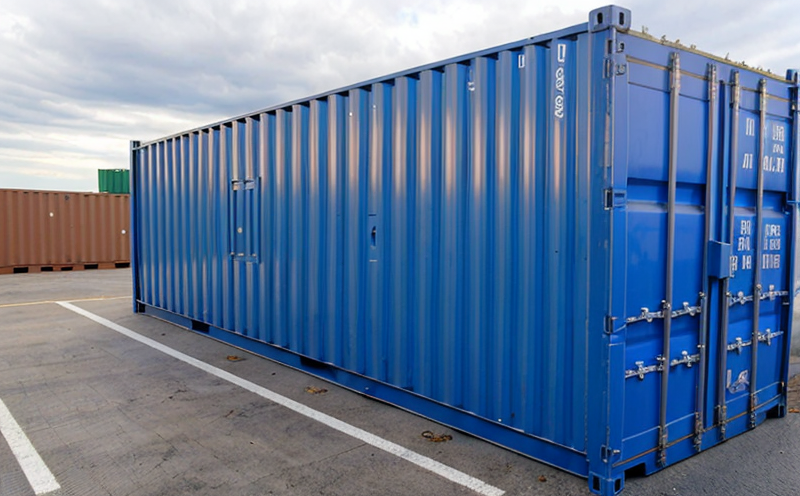DIN EN ISO 604 Compression Testing of Plastic Storage Plastics
The DIN EN ISO 604 compression test is a standard procedure used to evaluate the mechanical properties of plastic storage containers. This method assesses how a specimen withstands compressive forces without undergoing deformation or failure, which is critical for ensuring the safety and reliability of plastic storage containers in various industries.
During this test, specimens are placed between two parallel plates under controlled conditions. The test measures the load at which permanent set occurs, the force required to cause a specified percentage of strain, and the maximum load before failure. This information is essential for understanding how the material will behave in real-world applications such as stacking containers on top of each other.
The DIN EN ISO 604 test provides valuable insights into the mechanical performance of plastic storage containers under compression. It helps quality managers, compliance officers, R&D engineers, and procurement specialists make informed decisions about material selection, design improvements, and process optimization. This standard ensures that products meet international quality standards, enhancing customer satisfaction and trust.
The testing procedure typically involves the following steps:
- Specimen preparation according to the specified dimensions and tolerances.
- Mounting the specimen between two parallel plates in a compression tester.
- Applying load at a controlled rate until permanent set occurs or failure happens.
- Recording critical data points such as force, strain, and displacement.
The results of this test are crucial for ensuring that plastic storage containers can handle the stresses they will encounter during use. By adhering to DIN EN ISO 604, manufacturers ensure compliance with international standards, which enhances product quality and reliability.
Understanding the mechanical properties of plastics under compression is essential in various industries such as packaging, chemical processing, and food storage. The test data provides insights into how plastic materials perform when subjected to compressive forces, enabling continuous improvement in design and manufacturing processes.
The DIN EN ISO 604 standard is widely recognized for its accuracy and reliability. It ensures that the mechanical properties of plastic storage containers are consistently measured across different laboratories, contributing to uniformity and comparability of results.
Benefits
The benefits of conducting DIN EN ISO 604 compression testing include:
- Enhanced Product Quality: Ensures that the plastic storage containers meet international quality standards, thereby enhancing product reliability.
- Improved Safety: By understanding how materials behave under compression, manufacturers can design safer and more robust products.
- Cost Efficiency: Identifying material weaknesses early in the development process allows for timely corrections, reducing costly rework or recalls.
- Compliance Assurance: Meeting international standards ensures compliance with regulatory requirements, avoiding potential legal issues and fines.
- Informed Decision-Making: Provides valuable data that can inform material selection, design improvements, and process optimization.
The test also helps in identifying the optimal materials for specific applications, ensuring that storage containers meet the required performance criteria. This leads to a reduction in waste and increased efficiency in manufacturing processes.
Why Choose This Test
Selecting DIN EN ISO 604 compression testing for plastic storage plastics is essential due to the following reasons:
- International Recognition: The standard is globally recognized, ensuring consistent and reliable results across different laboratories.
- Regulatory Compliance: Ensures that products meet international quality standards, facilitating easier market access in various countries.
- Material Optimization: Provides critical data for optimizing material properties to suit specific application needs.
- Cost Savings: Early identification of material weaknesses can prevent costly rework or product recalls.
The test is particularly beneficial in industries where the integrity and safety of storage containers are paramount, such as pharmaceuticals, food processing, and chemical manufacturing. By choosing DIN EN ISO 604 compression testing, manufacturers can ensure that their products meet the highest quality standards, thereby enhancing customer satisfaction and trust.
Customer Impact and Satisfaction
The impact of conducting DIN EN ISO 604 compression testing on customers is profound. By ensuring that plastic storage containers are safe, reliable, and meet international quality standards, manufacturers can build a strong reputation for product excellence. This enhances customer satisfaction and trust, leading to increased market share and repeat business.
Customers benefit from products that are designed with their safety in mind. The test ensures that the materials used in storage containers do not deform or fail under expected loads, reducing the risk of accidents or damage to stored goods. This reliability is crucial for industries where product integrity and safety are critical, such as pharmaceuticals and food processing.
Moreover, compliance with international standards can open doors to new markets. Customers in these regions expect products that meet global quality benchmarks, and ensuring DIN EN ISO 604 compliance helps manufacturers meet these expectations. This not only enhances the reputation of the brand but also fosters long-term relationships with customers.
The test data provides valuable insights into material performance, enabling continuous improvement in design and manufacturing processes. This ensures that products are not only safe but also optimized for cost-effectiveness and efficiency. Ultimately, this leads to enhanced customer satisfaction and loyalty, contributing to the overall success of the business.





